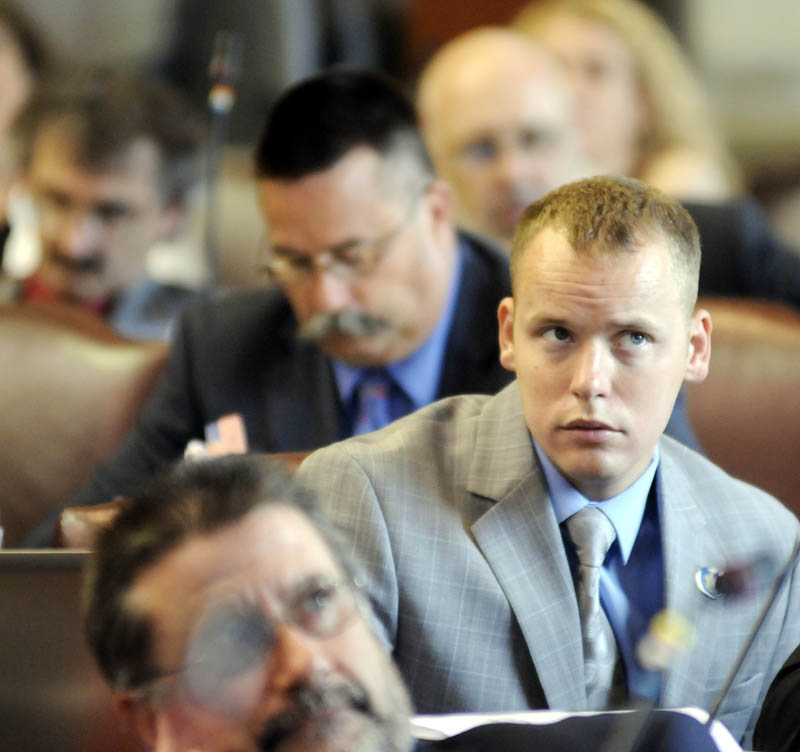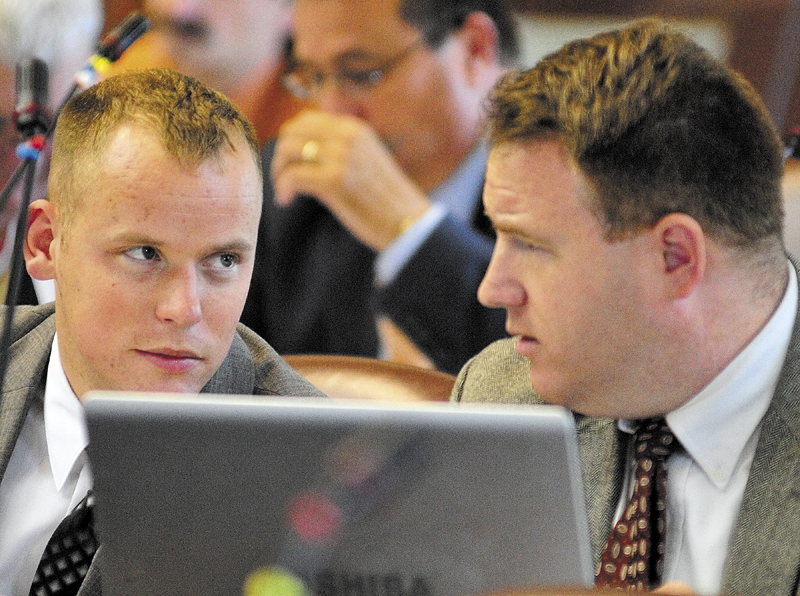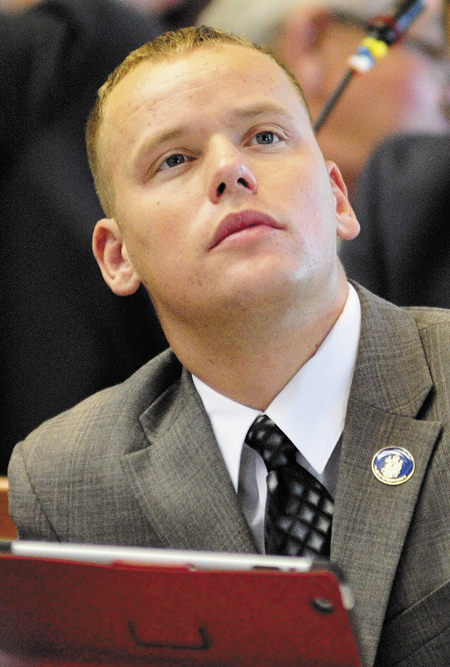AUGUSTA — His legislative committee was about to delay a vote on a controversial gun-control bill, and Rep. Corey Wilson was growing impatient. The Republican already knew he was going to vote against it.
The bill, sponsored by Senate President Justin Alfond, would have set a 10-round magazine limit for guns in Maine. For Wilson, a 28-year-old former U.S. Marine in his freshman term representing east Augusta, it was a nonstarter.
So he said committee Democrats, in the legislative majority, were either using the bill as a “bargaining chip” in negotiations with Republicans or keeping it alive in deference to Alfond, a Portland Democrat.
Sen. Stan Gerzofsky, D-Brunswick, the Senate chairman of the Criminal Justice and Public Safety Committee, said then that he found Wilson’s assertions “offensive.”
“Corey came in as a freshman like many freshmen do, clearly full of himself and wanting to get something accomplished,” Gerzofsky, a seven-term legislator, said recently. “There were times he heard the title of the bill and he thought he could vote.”
With no political experience before this year, Wilson admits he came to the State House not knowing the legislative process.
“I just knew I would be leading and advocating for my community,” he said.
However, the freshman’s side ended up winning the battle in beating back gun-control measures, with Wilson as one of the main faces of opposition.
He showed himself as a party maverick as well, as one of five Republicans in the House of Representatives to vote to expand Medicaid, the federal-state health care program for the poor, to 70,000 low-income Mainers.
Wilson also involved himself in an issue that garnered prominent attention in the city of Augusta — whether the state should notify communities in advance when moving certain mental patients — and he prevailed.
Politics not the plan
Wilson didn’t expect to be a politician.
He grew up in northern Kennebec County, living with a single mother and five other siblings in Albion and Clinton until age 12, when he moved to Fairfield with his father, who ran a small pressure-washing company.
He said he grew up poor as a child, with his family often subsisting on items from food banks. When he got older, he worked odd jobs. He got hired at the Lobster Trap II, a since-closed restaurant in Fairfield, the day before he turned 15 and later delivered the Morning Sentinel.
He always had an eye on the military, however. He was a member of the Young Marines in childhood and joined the service six days after turning 17.
“I knew that was what I wanted to do, and I planned on making a career out of it,” Wilson said. “It was never my destiny to be a politician.”
He served two tours of duty in Kuwait and Iraq between 2003 and 2007. On the second tour, he lived in and patrolled the area around the Haditha Dam, a major hydroelectric dam in Iraq’s Anbar Province that American troops seized in the 2003 invasion of the country to prevent its destruction.
He attained the rank of sergeant by the end of his active-duty stint, which ended when he was prohibited from re-enlisting because of back and knee injuries.
The Marines paid for him to get a license to drive a tractor-trailer truck — his first job after returning to Maine before taking a job with the Department of Homeland Security.
He resigned before deciding to run for office. “Political dysfunction” was the main reason he ran.
“If we spent more time focusing on making good policy and less time taking jabs at each other, we’d probably accomplish more for the citizens of the state of Maine,” he said.
‘The most important right’
While Gerzofsky argues Wilson’s highest-profile bill this session was bad policy, he and most in the Legislature didn’t agree.
On Valentine’s Day, Wilson was seated with Republican legislative leaders at a news conference. Earlier that day, the Bangor Daily News submitted public-access requests for the names, addresses and dates of birth of all concealed-handgun permit holders in Maine.
It echoed a New York newspaper’s December decision to publish names of concealed-weapon permit holders in its coverage area after the shootings at Sandy Hook Elementary School in Newtown, Conn., but the Bangor newspaper said it was getting the names only for background reporting on domestic violence and drug abuse.
The lawmakers called the news conference to rebuke the newspaper, as earlier that week Wilson had introduced a bill to make that identifying information private.
“The point of this bill originally was to ensure that this type of information was not released in the manner that it has potentially been requested,” Wilson said at the news conference.
The frenzied gun-rights grass roots jumped on the requests, calling and emailing complaints to the newspaper. Politicians capitalized. Legislative leaders passed a bill to prohibit temporary disclosure of the information within days.
Wilson’s permanent bill passed the next month.
All the while, the bill’s opponents — including news media and civil-liberties advocates — said it wasn’t necessary and it was supported only by a vocal minority of gun advocates.
“It was politically driven, not policy-driven,” Gerzofsky said.
Wilson also became one of the highest-profile opponents of other gun-control measures, including bills to mandate background checks before private and gun-show firearm purchases.
None of those proposals passed.
“He throws himself right into issues he’s interested in,” said David Trahan, executive director of the Sportsman’s Alliance of Maine, a pro-gun group that worked closely with Wilson. “He goes out there and fights for what he believes in.”
During his campaign, the National Rifle Association gave Wilson an “A” rating; but Wilson said he doesn’t vote they way he does to seek the group’s approval.
“I’ve experienced a lot of things that lead me to believe that a person’s individual right to protect themselves is probably the most important right in my view,” he said. “If you can’t protect yourself, how can you possibly protect the other rights that you’re granted?
‘A lot of courage’
While Wilson toed his party’s line on guns, that doesn’t sum up his entire session.
Under heavy pressure from those on both sides of the aisle, he voted unsuccessfully to support Medicaid expansion — one of the most hotly contested issues in Augusta this year.
Gov. Paul LePage and most Republicans vehemently opposed it because of concerns of future cost. Democrats made it one of their key goals. Wilson’s name showed up on a list of lawmakers LePage staffers tried to have U.S. Sen. Susan Collins lobby on the issue, a request the senator’s office refused.
Wilson’s vote “showed a lot of courage, particularly as a freshman,” said Assistant Senate Majority Leader Roger Katz, a Republican who brokered a compromise deal on expansion that narrowly failed to pass in the Legislature after a LePage veto.
“I think he’s a good Republican, but he realized he was sent here to exercise independent judgment,” Katz said.
Wilson, now pursuing a higher-education degree that would set him up to work in the health care industry, said his vote was motivated by many factors: reducing charity care costs to insurance ratepayers, supporting employees of MaineGeneral Medical Center in his district and belief in a “right to quality health care.”
Rep. Matthew Pouliot, R-Augusta, wasn’t persuaded by the arguments for Medicaid expansion, saying it could cost the state too much in the long term.
“He believes that universal health care is the solution and I don’t,” Pouliot said of Wilson. “There’s nothing wrong with that. We’ve just got a different perspective.”
Wilson also grabbed headlines when he weighed in on the issue of the state moving mental health patients, including some found not criminally responsible for violent acts, into group homes in Augusta neighborhoods. Wilson said he was troubled when the Department of Health and Human Services did that recently in Augusta without first notifying city officials.
His bill, L.D. 805, appeared to initially stall with a 6–6 “ought not to pass” vote by the State and Local Government Committee, but the measure later received enough votes and cleared the House and the Senate. It became law without the governor’s signature.
Mary Louise McEwen, superintendent of Riverview Psychiatric Center in Augusta, didn’t testify for or against the bill but said it “singles out clients who are found not criminally responsible from all other clients the department serves.”
“Call it a stigma, call it what you want; but I believe in those cases, the public has a right to weigh in,” Wilson said. “This specific type population, we know in the past has been extremely violent and dangerous, and their location should be considered differently than others.”
Augusta City Councilor Cecil Munson said Wilson’s been attentive to community issues so far in the Legislature.
“All in all, he’s a good listener,” Munson said.
Wilson said voting his conscience hasn’t damaged his relationship with his party. For example, he said people who disagreed with him on his Medicaid vote “respected that I at least had it in me to vote that way.”
“I want my constituents to know I work for one person — that’s them,” he said.
Michael Shepherd — 621-5632
mshepherd@mainetoday.com
Send questions/comments to the editors.





Comments are no longer available on this story